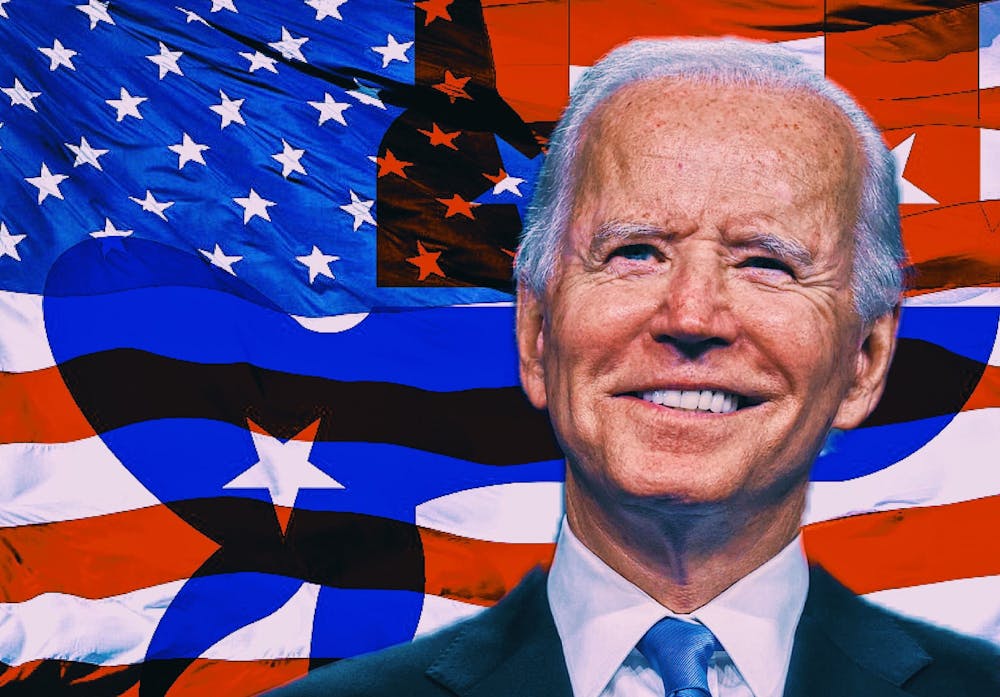Many people see election day as an “end to the horror” of the last four years. Specifically, many Biden voters supported him because they want normalcy again—or a return to Obama–era politics. However, as Trump never failed to point out, many of the policies that people laud him for were also implemented under Obama. And in general, what many see as “normal” was just as bad—but the bad was hidden under better rhetoric.
While Trump has faced a lot of rightful criticism for inciting racism and validating white supremacy, Biden’s past isn’t rosy either, considering that he fought for segregation, was against school busing in the 1970s, and wrote part of the 1994 Crime Bill. When confronted by Vice President Kamala Harris about his positions on segregation, he didn’t even take accountability, claiming it was a mischaracterization of his positions.
Of course, many say “that was a different time period”—but his current record on racism doesn't exactly sparkle, either. Biden has consistently taken a centrist stance on issues regarding race, and specifically, on issues regarding racist policing that oftentimes leads to the death of Black people. When asked about the recent killing of Walter Wallace Jr., he denounced the looting and rioting—words that have been historically used to mischaracterize Black civil rights movements.
We’ve been conditioned as a society to see centrism as a positive. Being able to negotiate with both “sides of the aisle” is a trait that people want in government officials. As a matter of fact, it's something that Biden himself has been praised for. But centrist rhetoric won’t bring about much needed systemic change, especially in the face of the racist structures of the United States.
While Biden claims that he's going to “ease racial tensions” with his presidency, and has condemned police shooting Black people, he is also adamantly against defunding the police, and actually plans to increase police funding. It's not possible to “end racism” and be against the violence police—and the law in general—inflict on Black people, but still also want to increase police funding. The police are doing exactly what they’re meant to do. After all, the origins of the police include slave patrols, and enforcing Jim Crow laws. Giving them more money only worsens the problem.
There is an intense need for reinvestment in Black communities, as exhibited by the disproportionate number of Black deaths due to COVID–19. Mass incarceration and the school–to–prison pipeline won’t be erased by an independent Task Force on Prosecutorial Discretion—one of Biden’s solutions—in a system designed to not hold police accountable. The United States has the highest incarcerated population in the world, and Black and Latinx people are disproportionately represented. Clearly, this system is not working, and it’s especially not working for people of color.
There’s also a need for wealth redistribution in general—something Biden has openly dismissed. “No one wants a revolution,” Biden has said. And that’s the problem: he’s right. While this is beginning to change, the majority of Americans, brainwashed by the founding fathers’ values of individual responsibility, view socialism as the enemy, and are unsupportive of a better safety net. Additionally, people are generally unsupportive of welfare programs due to racial resentment, even though a better safety net would help not just Black people, but also the white working class.
People who proposed such policy, like Bernie Sanders and Elizabeth Warren, are told that it “won’t pass” in Congress and are asked how it would be paid for. Of course, the idea of taxing the top 1% is dismissed, because people believe that they have “earned” their money and shouldn’t have it “taken away.” They’re dismissed as far leftist socialists, even though Warren is a self–proclaimed capitalist, and Sanders’ policies would be considered centrist in other Western nations.
There’s a number of other issues that Biden has given lackluster solutions to, such as the environmental crisis, selling arms to Saudi Arabia, and the Palestine–Israeli conflict. While no one knows what Biden may personally believe, his public viewpoints are most likely largely influenced by wanting to win the presidential election, and subsequently have success in passing policy through Congress. It’s unlikely that Biden would win with a platform that called for the defunding of police, reinvestment into the poorest communities, the delegitimization of Israel as a state, and cancelling selling arms to Saudi Arabia. Even if he did, these policies would be highly unsuccessful in Congress due to the heavy role of lobbyists and interest groups. This points to a larger issue: electoral politics was built to be least advantageous to poor people, and specifically, to Black–Americans. We are always picking the “lesser of two evils” rather than a good option—and this isn’t something that started in 2016.
But because Biden won’t be as bold as Trump in using bombastic language, his policies that will hurt the most vulnerable people around the world might go unquestioned in the public eye. While Trump’s antics on Twitter and on the world stage were frightening, what’s even scarier is what Biden could potentially get away with under the mask of beautiful rhetoric. Admittedly, a Biden win is better than a Trump win, if only marginally—but it doesn’t begin to address the systemic issues in our nation. In the face of the ongoing crises around the world, and an unrelenting disease, now is the time to question leaders more than ever, and make sure they’re fulfilling the interests of the most vulnerable populations.







